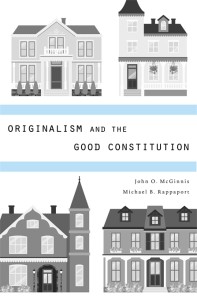Originalism All the Way Down?
How should the Constitution be interpreted? What context should be considered, if at all? And if the Constitution should be interpreted as it was originally conceived, how does one go about determining what the Founders meant? In a review of Originalism and the Good Constitution by John O. McGinnis and Michael B. Rappaport*, Kurt T. Lash at the University of Illinois College of Law examines the rather complicated matter, highlighting the strengths and flaws in their argument. Lash defines originalism in the context of the review as a “reformist movement in contemporary American constitutional law” whose proponents “reject modern interpretive theories such as ‘living constitutionalism’ and call for the restoration of the foundational understanding of the text.” The next question, of course, is how one goes …
State Regulation and the Necessary and Proper Clause
The Necessary and Proper Clause in the Constitution is commonly used to justify unconstitutional federal authority, and William Baude at the University of Chicago Law School believes a stricter interpretation of the clause is in order – albeit the feds still get to decide the interpretation. In his paper “State Regulation and the Necessary and Proper Clause,” he writes that the clause should be reexamined within the context of federal and state marijuana laws to give “state regulation…a bigger role in fixing the limits of federal constitutional power.” The clause reads as follows: The Congress shall have Power … To make all Laws which shall be necessary and proper for carrying into Execution the foregoing Powers, and all other Powers vested by this …
